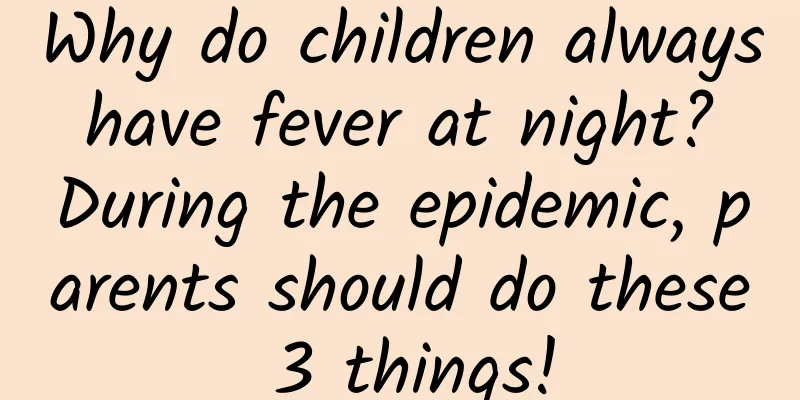Why do children always have fever at night? During the epidemic, parents should do these 3 things!

|
I believe many parents have had this experience: My baby caught a cold and had a fever. He seemed to be recovering during the day and his temperature went down, but who would have thought that at night his temperature would soar again. Go to the emergency room quickly. It may be another night of tossing and turning, making both adults and children very tired. The infection rate of the new coronavirus has continued to rise recently. Children may also have fever after being infected with the new coronavirus. Once a fever occurs, the body temperature may rise at night and drop during the day. Why does the fever get worse at night? What is going on and what can I do? 01 Why is it easier to have a fever at night? To understand why it's easier to get hot at night, it's important to first understand how the body regulates temperature. Body temperature is controlled by the thermoregulatory center in the hypothalamus. To use an analogy that is not quite accurate but easy to understand, the way the human body regulates its temperature is like we install a room thermostat in our home; Once the room temperature is higher than this temperature, cooling starts; once it is lower than this temperature, heating starts. The body temperature regulation center also sets a temperature set point. When the actual body temperature is lower than the set point, the human body will increase the body temperature by causing peripheral blood vessels to constrict (manifesting as cold hands and feet), reducing skin heat dissipation, and causing muscles to produce heat (which may manifest as chills). Once the body temperature is higher than the set point, the peripheral blood vessels will dilate and the skin will sweat to dissipate heat until the body temperature is consistent with the set point again. 1. It is normal for the body temperature to be high at night. When a normal person is not sick, their body temperature will fluctuate throughout the day. This is controlled by the body temperature regulation center. Generally, the body temperature is lowest in the early morning and highest in the evening [1]. When you are sick with a fever, your daily body temperature will continue to be low in the early morning and high at night. 2. The reason for getting hot easily at night is that you cover yourself with a thick blanket, which prevents your skin from dissipating heat. Junior high school physics knowledge tells us that heat dissipation is mainly through evaporation, radiation, conduction, convection and other methods. When the relative humidity exceeds 75%, the evaporative cooling mechanism fails[2]; When the ambient temperature is higher than the body surface temperature, the heat dissipation methods of radiation and conduction become ineffective; When there is no air flow around the body, convection cooling also fails... At night, we cover ourselves with thick quilts, which are often hot, humid, and airtight. This causes all heat dissipation mechanisms to fail, the skin cannot dissipate heat, and the body temperature naturally rises. 02 What should I do if I have a fever at night? After figuring out the reasons why it is easier to have a fever at night, we can make targeted preparations: 1. Be prepared for psychological and medical treatments If your child's temperature drops during the day, don't think that the child has recovered from the illness. If the temperature goes up again in the evening, don't think that the disease has worsened or recurred. This is a normal fluctuation in body temperature. Even if the body temperature is normal during the day, we still have to make sure that there are spare antipyretic drugs at home, so that if the body temperature rises at night and medication is needed, we will not be in a hurry. 2. Wear less, cover less, and lower the indoor temperature Other physical cooling measures are ineffective and unnecessary. Don't cover your child with a thick blanket, as it won't dissipate heat! But if your child is still shivering (temperature rising), you can keep him warm. You should know that when we get sick and have a fever, it is because the temperature set point of our body temperature regulation center has risen. In other words, the hypothalamus is deceived into thinking that 38℃ or even 40℃ is the normal body temperature, and it directs the muscles to produce heat continuously until the temperature reaches what it considers to be the "normal body temperature." If you use physical cooling when the body temperature is rising, it will be completely useless and will only aggravate the child's discomfort. In addition, night is time for sleeping. If you are busy wiping your body and taking a bath and cannot rest, it will not be worth it. 3. When should I take antipyretic medicine? If your child is sleeping peacefully and breathing steadily, there is no need to wake him/her up to take antipyretics[3] or to take his/her temperature too frequently. The general principle is to try not to disturb your child's sleep. Ensuring adequate sleep is also very important for recovery from illness. If your child can't sleep and feels unwell, give him or her antipyretics. Children aged 3-6 months can choose acetaminophen, and children over 6 months old, including adults, can choose acetaminophen or ibuprofen (please read the drug instructions carefully for usage and dosage). Unlike physical cooling, antipyretics reduce fever by lowering the body temperature set point. There is no need to worry about how high the temperature should be before taking antipyretics (so it is recommended not to measure the temperature frequently). Whether to take medicine should depend on the child's comfort. Remember, antipyretics cannot help us resist pathogens or speed up recovery from illness. They can only make us feel more comfortable when fighting the disease. In this way, it can be understood that the main criterion for whether or not to take antipyretics is whether the child feels uncomfortable. While feeding the medicine, you can also let your child drink more water. It is also recommended to drink more water during the day. The heat dissipation process will consume a lot of water from the body. Drinking more water can help prevent dehydration. But I still want to emphasize that if the child is sleeping quietly, there is no need to wake him up to drink water. Let the child have a good rest. 03 When do you need immediate medical attention? Regarding children's problems, remember that their mental state always comes first! But how do we judge whether a child's mental state is good after falling asleep? If the baby's face color is similar to usual, or slightly red due to fever, and the breathing is stable (less than 60 times per minute for children under 2 months old, less than 50 times per minute for children aged 2-12 months, and less than 40 times per minute for children over 1 year old, it can be considered as stable breathing), you can let the child sleep quietly without disturbing him; If your child is pale or purple, has rapid breathing, and you try to wake him or her but cannot, or he or she wakes up and quickly falls asleep again, you need to go to the hospital immediately. In addition, if the baby is under 3 months old, or the body temperature is over 40℃ and oral antipyretics are ineffective; If the fever does not improve for more than 3 days, or if the child is found to be in poor spirits, breathing rapidly, or with a significantly decreased urine output at any time, you should go to the hospital for treatment immediately. References: [1] Mackowiak PA, Wasserman SS, Levine MM. A critical appraisal of 98.6 degrees F, the upper limit of the normal body temperature, and other legacies of Carl Reinhold August Wunderlich. JAMA. 1992 Sep 23-30;268(12):1578-80. [2] Bross MH, Nash BT Jr, Carlton FB Jr. Heat emergencies. Am Fam Physician. 1994 Aug;50(2):389-96, 398. [3] Fever in infants and children: pathophysiology and management. UpToDate. https://www.uptodate.cn/contents/zh-Hans/fever-in-infants-and-children-pathophysiology-and-management. Author: Zhang Lujie, deputy chief physician of pediatrics Review | Sun Siqing, Chief Physician, Department of Respiratory and Critical Care Medicine, Nanjing Second Hospital |
Recommend
Choosing children's food is not harmful, but it is mostly unnecessary.
After becoming a mother, a woman will pay special...
What happens if I haven’t had my period for 40 days?
If your period does not come on the day it is sup...
How do women protect their cervix?
As women age, some body functions will change. Fo...
Don't neglect the elderly's nighttime health care
People over 65 years old often suffer from chroni...
Can I lie on my side after the transplant?
In vitro fertilization is a process in which sper...
What does cervical screening include?
In recent years, more and more women have suffere...
How to do yoga to regulate irregular menstruation?
I believe that many women will suffer from sympto...
What to eat during pregnancy
Women eat a lot of nutritious foods during pregna...
What causes acne on girls' chests?
Acne on the face is relatively familiar to everyo...
Are you one of the elegant women in the eyes of men?
I believe that every man likes women with tempera...
The harm of pregnant women soaking their feet to the fetus
There is no harm to the fetus for pregnant women ...
Advantages and disadvantages of cesarean section and natural birth
When a pregnant woman is about to give birth, she...
Is there any way to cure dysmenorrhea?
Many women suffer from dysmenorrhea. When symptom...
What to do if you have stinging pain in your urethra
Pain in the urethra and frequent urination in wom...









